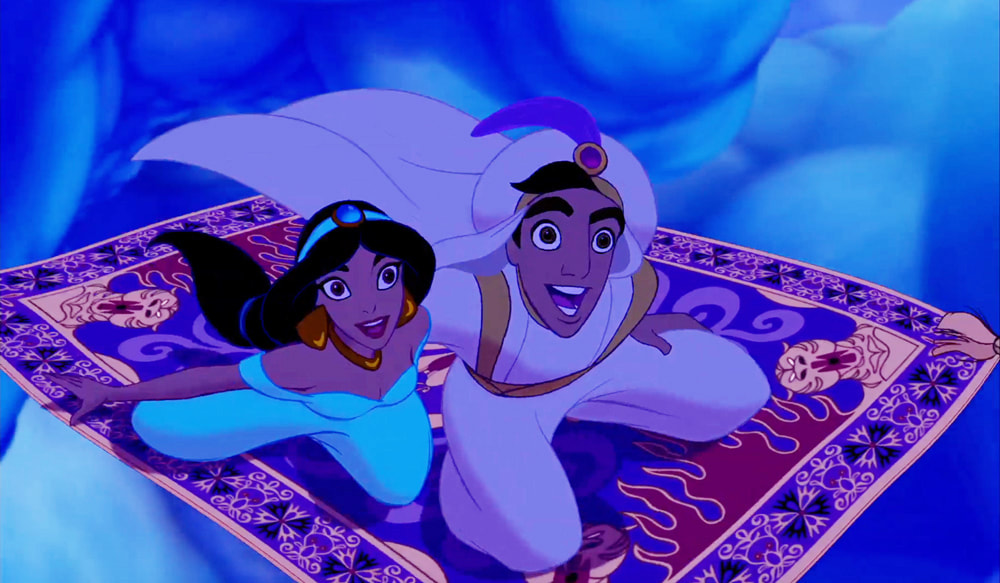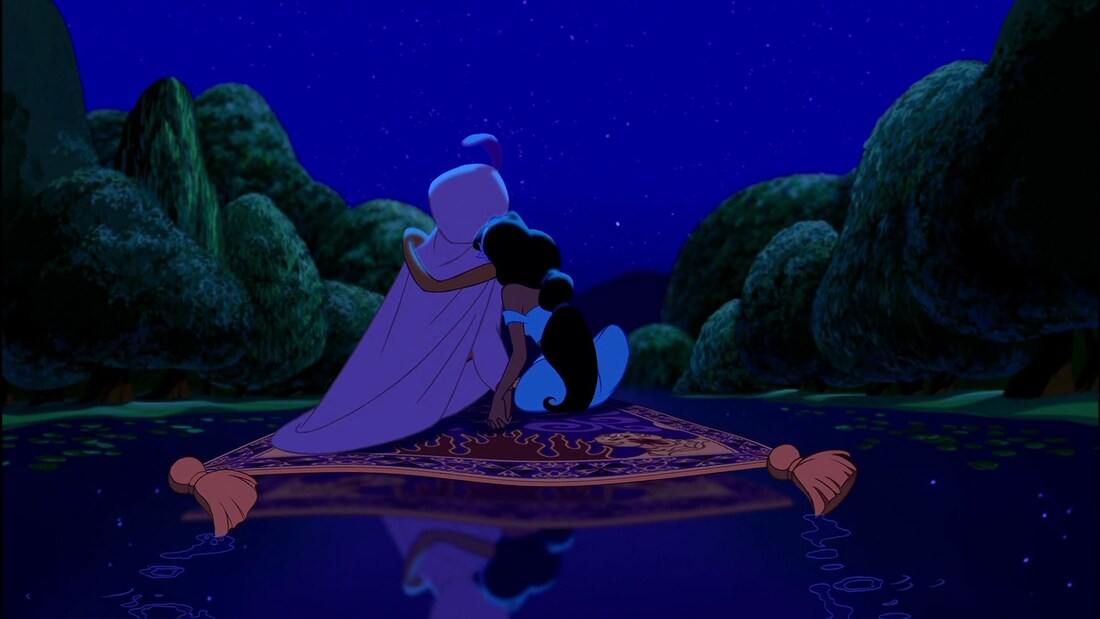|
Freedom is a great thing. It’s a fundamental building block of modern society. We take for granted our right to free speech, freedom of religion, freedom of assembly, and, for my American friends, freedom to organize a militia and revolt against the imperial overlords at the slightest hint of taxation without representation. The right to elect representatives to decide the right tax for loose leaf chamomile tea shall not be infringed. The world we live in today really is a new world. It’s less hierarchical and more socially mobile than the old world. Despite starting out in poverty, people like J.K. Rowling can make millions of dollars a year writing stories about little wizards going off to boarding school. Meanwhile, the spread of technology has democratized knowledge, giving us access to all the true crime podcasts and cat videos we want. We like our freedoms, and we’d rather nobody put restrictions on them. 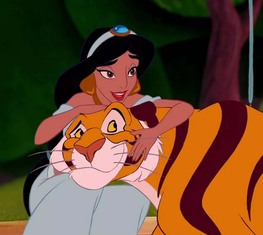 If we don’t have freedom, we fight for it. The 1992 animated classic Aladdin includes a number of characters searching for freedom. They want to leave the old world behind and find their way into a new world. The princess Jasmine, for instance, feels trapped by rules and palace walls. It turns out being a royal isn’t all just wealth, privilege, and pet tigers who strike fear in the hearts of your enemies. It brings with it certain restrictions. Jasmine’s marriage prospects are limited to wealthy princes who happen to impress her father, the sultan. Commoners are excluded from the running. Though, it’s not like Jasmine has many opportunities for meeting commoners. She doesn’t even get to leave the house. In an unmistakeably symbolic moment, Jasmine flings open the door to a bird cage and lets loose a flock of doves. She watches them with longing as they soar up into the atmosphere. Here’s to hoping the doves had long, fulfilling lives and didn’t end up being served on a plate with a side of mashed potatoes the moment after they were freed. Aladdin is at the opposite end of society. As Agrabah’s most successful thief, Aladdin seems like he’s doing pretty well. He easily weaves his way through crowds and over rooftops, outwitting the authorities at every turn. With a smile on his face he sends his trusted monkey Abu to distract the merchants while he gets the goods. Breaking the rules all day long, you’d think Aladdin would feel like a free man. He can get anything for himself at no cost. Plus, he has that cool little fez he wears. What more could he want? Yet Aladdin feels just as trapped as Jasmine. Prince Achmed, one of Jasmine’s many suitors, calls Aladdin “a worthless street rat,” saying, “You were born a street rat, you'll die a street rat, and only your fleas will mourn you.” That’s a little unfair. I’m sure the rodents of Agrabah would show their solidarity as well. But maybe that’s a small consolation when you’re constantly on the run, with guards pointing their swords at you on every corner. 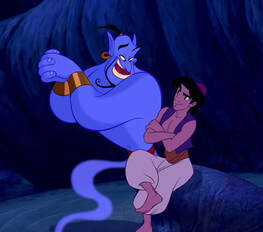 And finally we come to the most powerful being in the story, the friendly blue genie who can make your wishes become reality. With the snap of his fingers he can move heaven and earth for you. You can use your three wishes to make whatever you want appear out of thin air. But even the genie doesn’t have the freedom he wants. He may have “phenomenal cosmic powers,” but he’s pretty much a slave to whoever takes possession of the magic lamp. Those golden shackles around his wrist aren’t there just to make a fashion statement. The genie just spent ten thousand years stuck inside that little lamp, and the best thing he can hope for is that some nitwit will come along and let him out occasionally just so to be ordered around. Not a very fulfilling existence. That may be pretty sad for the genie, but for Aladdin the genie seems like the answer to all his wants and desires. Aladdin the street rat has a dream that one day he’ll be “rich, live in a palace, and never have any problems at all.” Isn’t that how the saying goes? More money, less problems? I’m pretty sure that’s it. Aladdin’s situation becomes more fortuitous when he starts to fall for Jasmine and learns that she’s a princess. How do you become worthy of a princess? Become a prince, of course. With the genie’s help, Aladdin transforms into Prince Ali and makes a grand entrance into the city of Agrabah with an entourage of seventy-five golden camels, ninety-five white Persian monkeys, and a giant balloon gorilla. What’s not to like? Add a bouquet of roses in there and romance is pretty much guaranteed. 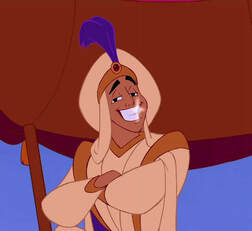 This is the moment we’ve all been waiting for. Now that Aladdin is a prince he has the freedom to pursue his true love. He thinks there’s nothing to stop him and Jasmine from being together. Aladdin is so sure of himself that he tells the sultan, “Your majesty, I am Prince Ali Ababwa! Just let her meet me. I will win your daughter!” Well, Aladdin might feel free, but Jasmine does not. She’s still in the same old situation. Upon seeing the spectacle of yet another wealthy prince arriving in style, hoping to win her hand, Jasmine is less than impressed. Annoyed would be a better word. Having everybody else meeting to decide her fate is all-too-familiar. Aladdin’s newfound freedom is a whole new world to him, but to Jasmine it looks the same as the old world. It’s only when Jasmine gets to escape the palace walls on the magic carpet that she gets a whiff of that freedom she’s wanted for so long. Meanwhile, the genie is also a little less than impressed with Aladdin after he goes back on his promise. Aladdin said he would use his third wish to grant the genie his freedom, but circumstances get in the way. Again, it seems more like the old world than the new. Why does Aladdin do it? He’s afraid. He isn’t really a prince, after all. He’s a poor boy who got lucky and found a magic lamp. Aladdin fears that without the genie at his side he has no hope of winning Jasmine’s heart. He is brought to his lowest point when the villain Jafar steals the lamp and scoffs, “Without the genie, boy, you’re nothing.” Aladdin is left totally powerless. Jafar transforms Aladdin back into a poor street urchin, imprisons Jasmine, and takes control of Agrabah. Aladdin has lost his freedom. In fact, it was his unwillingness to use his power to free the genie that allowed for himself, Jasmine, and the genie to fall under the power of Jafar. Aladdin could have prevented all of this if he had used his freedom in the right way. He thought he was bringing about a new world, but his choices help to bring the harsh reality of the old world crashing down on his head. We think of freedom as a goal we need to achieve and that once we get there everything will be all right. But freedom is a starting point. Being free means you still have a whole maze of choices ahead of you. You can do the selfish thing and accrue power for yourself, putting others down in the process. Or you can help others rise to that same freedom you enjoy. And so, when Aladdin does regain possession of the lamp once again, it’s not entirely clear what will happen next. He still has to make a choice. What is he going to use his last wish for? He wants to marry Jasmine and the only way he can do that is if he wishes to be a prince again, with all the wealth and prestige that comes with it. But this time Aladdin takes the other path. He chooses to sacrifice his own desires and uses his final wish to give the genie his freedom. And with that choice Aladdin at last lives up to the promise of a whole new world that we all remember from that catchy song. The old world of masters and slaves begins to fade and the new world of free will comes rushing into existence. It’s only in this new world where selflessness and love become possible. Benjamin Franklin once said, “Only a virtuous people are capable of freedom.” Being free doesn’t guarantee you’ll make good choices. It places the responsibility of choosing into your hands. If you only care about your own wishes and desires, chances are you’ll undervalue other people and the world you create will start looking just like the old one. Then you’ll miss out on some important things. Genuine connections with people, for example. One of the genie’s rules is that you can’t wish for someone to fall in love with you. Love has to be freely given or it isn’t love. At the end of the film when Jasmine finally has the freedom to choose her husband, regardless of his royal status, she chooses Aladdin. There’s something profound about being chosen for something. It means so much more when you know that the choice was made freely. How we choose to act in our relationships, families, and communities—all of these decisions have a real impact. To paraphrase Peter Parker's uncle Ben, with great freedom comes great responsibility. How will we decide to use the freedom we have? The kind of world we create depends on our answer.
Comments
|
David Raphael HilderJoin the conversation as we explore the best there is in fantasy, sci-fi, adventure, and of course, the classics Archives
December 2020
Categories
All
|

